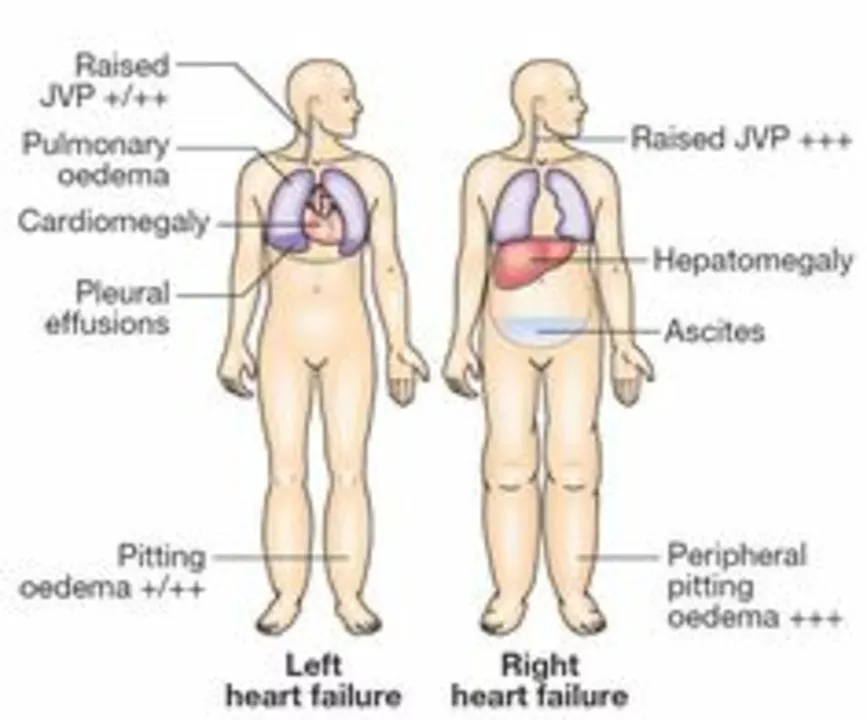Understanding Edema and its Connection to Heart Failure
As a blogger, I often come across various health conditions that can be quite alarming. One of these is edema, which is the medical term for swelling caused by the accumulation of fluid in the body's tissues. While edema can occur for various reasons, it is often linked to heart failure. In this article, we will delve deeper into the connection between edema and heart failure, discuss the symptoms of both conditions, and explore the available treatment options.
What Causes Edema in Heart Failure Patients?
Heart failure occurs when the heart is unable to pump blood effectively. This can lead to a buildup of fluid in various parts of the body, including the lungs, abdomen, and legs. This excess fluid can cause swelling, which is referred to as edema. In heart failure patients, edema is often a result of increased pressure in the blood vessels, reduced kidney function, and a hormonal imbalance caused by the heart's inability to pump blood efficiently.
Common Symptoms of Edema and Heart Failure
Edema and heart failure often share similar symptoms, making it essential for individuals to be aware of these signs. Some common symptoms include:
- Swelling in the legs, ankles, and feet
- Shortness of breath, especially when lying down
- Abdominal bloating or swelling
- Weight gain due to fluid retention
- Fatigue and weakness
- Rapid or irregular heartbeat
- Difficulty concentrating or confusion
- Reduced appetite and nausea
If you notice any of these symptoms, it is crucial to consult a healthcare professional for a proper diagnosis and treatment plan.
Diagnosing Edema and Heart Failure
When it comes to diagnosing edema and heart failure, healthcare professionals will typically begin by conducting a thorough physical examination and reviewing your medical history. They may also order various tests, such as:
- Blood tests to check for markers of heart failure
- Chest X-rays to visualize the heart and lungs
- Echocardiogram to assess the heart's function and structure
- Electrocardiogram (ECG) to evaluate the heart's electrical activity
- Stress tests to determine how well the heart functions under exertion
Based on the results of these tests, your healthcare provider will determine the most appropriate course of treatment for your specific condition.
Lifestyle Changes to Manage Edema and Heart Failure
Managing edema and heart failure often involves making some significant lifestyle changes. Some of the most effective changes include:
- Reducing sodium intake to minimize fluid retention
- Following a heart-healthy diet that is rich in fruits, vegetables, whole grains, and lean proteins
- Exercising regularly to improve cardiovascular fitness and overall health
- Monitoring your weight daily to track fluid retention
- Avoiding alcohol and tobacco products
- Managing stress through relaxation techniques, such as meditation or yoga
By making these changes, you can significantly improve your overall health and reduce the severity of your symptoms.
Medications for Treating Edema and Heart Failure
Depending on the severity of your condition, your healthcare provider may prescribe medications to help manage your symptoms. Some common medications used to treat edema and heart failure include:
- Diuretics, which help eliminate excess fluid from the body
- Angiotensin-converting enzyme (ACE) inhibitors, which relax blood vessels and lower blood pressure
- Beta-blockers, which slow the heart rate and reduce the heart's workload
- Angiotensin receptor blockers (ARBs), which have similar effects as ACE inhibitors but may be better tolerated in some individuals
- Mineralocorticoid receptor antagonists, which help reduce fluid retention and improve heart function
It is essential to follow your healthcare provider's instructions when taking these medications and to report any side effects or concerns promptly.
When to Consider Advanced Treatment Options
For some individuals, lifestyle changes and medications may not be enough to manage their edema and heart failure effectively. In these cases, advanced treatment options may be necessary. Some of these options include:
- Implantable devices, such as a pacemaker or an implantable cardioverter-defibrillator (ICD), to help regulate the heart's rhythm
- Cardiac resynchronization therapy (CRT), which uses a specialized pacemaker to coordinate the contractions of the heart's chambers
- Ventricular assist devices (VADs), which help the heart pump blood more effectively
- Heart transplantation, which may be considered for those with end-stage heart failure
It is crucial to discuss these options with your healthcare provider to determine the most suitable course of action for your specific situation.
Conclusion: The Importance of Early Detection and Treatment
In conclusion, edema and heart failure are closely linked conditions that can cause significant discomfort and health complications if left untreated. By understanding the symptoms and seeking prompt medical attention, individuals can improve their quality of life and reduce the risk of severe complications. With appropriate lifestyle changes, medications, and advanced treatment options when necessary, those living with edema and heart failure can lead healthier, more fulfilling lives.







ANTHONY SANCHEZ RAMOS
18 May 2023 - 08:17 AM
this is so helpful!! i had no idea edema could be tied to heart failure like this 🙌 just started monitoring my weight daily and cut out the salt bombs 🥲 thanks for breaking it down so simply
Fay naf
19 May 2023 - 12:20 PM
The pathophysiology here is grossly oversimplified. Edema in HF isn't just about increased venous pressure it's a neurohormonal cascade involving RAAS activation natriuretic peptide dysregulation and tubuloglomerular feedback failure. You're giving laypeople dangerous misconceptions if you reduce it to 'fluid buildup'
Matt Czyzewski
20 May 2023 - 19:25 PM
There's a quiet tragedy in how we treat edema like a symptom to be crushed with diuretics rather than a signal from a body begging to be heard. The heart doesn't fail because it's weak-it fails because we've forgotten how to listen. Maybe the real treatment isn't in pills but in presence. In stillness. In breathing with the rhythm the body still remembers.
John Schmidt
22 May 2023 - 16:29 PM
Yeah sure. Diuretics. ACE inhibitors. All the magic pills. But let's be real-most people don't change their diet. They don't exercise. They just take the meds and blame the system when they end up back in the hospital. This article is just sugarcoating a very messy reality. And don't even get me started on transplants-good luck getting one if you're not rich or white.
Lucinda Harrowell
23 May 2023 - 23:36 PM
I've seen this in my mum. The swelling in her ankles. The way she'd sit for hours just staring out the window. No one ever told her it wasn't just 'getting old'. It took a nurse to point out the weight gain. Sometimes the quietest symptoms are the loudest cries.
Joe Rahme
24 May 2023 - 14:56 PM
I appreciate the clarity here. My dad was diagnosed last year and the sheer amount of info was overwhelming. This breaks it down without being condescending. Thank you for the practical steps-especially the daily weight tracking. That one tip alone changed how we manage things now.
Leia not 'your worship'
26 May 2023 - 03:58 AM
Honestly if you're not doing keto and intermittent fasting you're just wasting your time. Heart failure? That's just inflammation from carbs and sugar. All these meds are just covering up the real problem. I've cured my cousin's edema with lemon water and breathwork. You're welcome.
Jo Sta
26 May 2023 - 16:40 PM
USA has the best healthcare in the world. If you can't afford meds or a transplant you just weren't trying hard enough. Stop being lazy. My cousin's grandma lived to 98 with nothing but salt and prayer.
KALPESH GANVIR
27 May 2023 - 01:09 AM
This is exactly what I needed. I'm from India and my uncle had heart failure last year. We didn't know what was happening until his legs swelled up like balloons. This article helped us understand what the doctors were saying. Thank you for writing this with care.
April Barrow
28 May 2023 - 03:31 AM
The section on lifestyle changes is accurate and actionable. The medication list is well-categorized. No fluff. Just facts. Well done.
Melody Jiang
28 May 2023 - 23:49 PM
It's easy to forget that behind every symptom is a person trying to live. Not just manage a condition. Not just survive a diagnosis. But live. I hope anyone reading this remembers that their worth isn't tied to their ejection fraction.
alex terzarede
29 May 2023 - 11:40 AM
I'd add one thing: sleep position matters. Elevating the head 6-8 inches can reduce nocturnal dyspnea significantly. Many patients don't realize this simple adjustment can cut nighttime awakenings by half. It's not in the guidelines but it's in the lived experience of thousands.